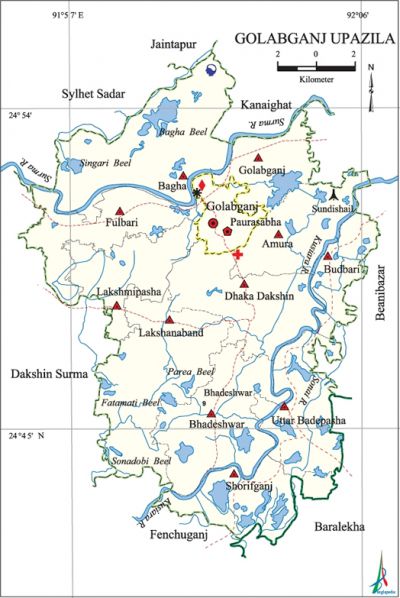Golapganj Upazila
Golapganj Upazila (sylhet district) area 278.34 sq km, located in between 24°41' and 24°55' north latitudes and in between 91°55' and 92°06' east longitudes. It is bounded by sylhet sadar, jaintiapur and kanaighat upazilas on the north, fenchuganj and barlekha upazilas on the south, beanibazar and Barlekha upazilas on the east, Sylhet Sadar and dakshin surma upazilas on the west.
Population Total 263953; male 132189, female 131764; Muslim 252167, Hindu 11725, Buddhist 21, and others 40. Indigenous communities such as manipuri and tripura belong to this upazila.
Water bodies Main rivers: surma, kushiyara, Sonai; Singari Beel, Bagha Beel, Fatamati Beel, Parea Beel and Sonadubi Beel are notable.
Administration Golabganj Thana was formed in 1922 and it was turned into an upazila in 1983.
| Upazila | ||||||||
| Municipality | Union | Mouza | Village | Population | Density (per sq km) | Literacy rate (%) | ||
| Urban | Rural | Urban | Rural | |||||
|
1 |
11 |
108 |
256 |
18060 |
245893 |
948 |
54.68 |
47.77 |
| Upazila Town | ||||||||
|
Area |
Mouza |
Population |
Density |
Literacy rate | ||||
|
11.14 |
4 |
18060 |
1621 |
54.68 | ||||
| Union | ||||
| Name of union and GO code | Area (acre) | Population | Literacy rate (%) | |
| Male | Female | |||
|
Amura 06 |
5010 |
7911 |
7892 |
49.08 |
|
Uttar Bade Pasha 77 |
5428 |
9107 |
9466 |
44.50 |
|
Golabganj 51 |
5561 |
15641 |
15350 |
57.2 |
|
Dhaka Dakshin 25 |
9079 |
14292 |
14167 |
50.43 |
|
Fulbari 43 |
5246 |
14830 |
14226 |
48.95 |
|
Bagha 08 |
9770 |
14150 |
14272 |
37.17 |
|
Budbari Bazar 20 |
2807 |
7868 |
8191 |
50.18 |
|
Bhadeshwar 17 |
8131 |
15562 |
15663 |
51.85 |
|
Lakshanaband 69 |
6841 |
12735 |
12556 |
46.24 |
|
Lakshmi Pasha 60 |
4706 |
10568 |
10442 |
53.63 |
|
Shorifgonj 36 |
4913 |
9525 |
9539 |
36.68 |
Source Bangladesh Population Census 2001,Bangladesh Bureau of Statistics.

Archaeological heritage and relics Mazar of Hazrat Bahauddin (R), house and temple of sri chaitanya Dev, Kailash Tila and Dewan Bridge.
Historical events Ronikeli and Bhadeshwar revolts were held in the upazila as a part of the historic Nankar Movement.
Marks of the War of Liberation Mass grave 1 (Sundisail), memorial monument 1.
Religious institutions Mosque 445, temple 3, church 1, tomb 9. Noted religious institutions: Bhadeshwar Mokambazar Jami Mosque.
Literacy rate and educational institutions Average literacy 48.24%; male 50.89%, female 45.64%. Educational institutions: college 3, technical college 1, secondary school 33, primary school 160, community school 15, kindergarten 60, madrasa 19. Noted educational institutions: Dhaka Dakshin Degree College, Bhadeshwar Mahila Degree College, Dhaka Dakshin Multilateral High School and College (1898), Bhadeshwar Nasiruddin High School (1919), MC Academy (1934), Fulbaria Madrasa (1882).
Newspapers and periodicals Weekly; Golap, Sonar Sylhet.
Cultural organisations Library 5, music academy 5, community centre 12, playground 10.
Tourist spots Bangladesh Scouts (Sylhet region), Petrobangla, Kailash Tila and the birth place of Sri Chaitanya Dev.'
Main sources of income Agriculture 34.05%, non-agricultural laborer 6.03%, industry 0.94%, commerce 14.64%, transport and communication 4.01%, service 6.16%, construction 2.88%, religious service 0.58%, rent and remittance 18.34% and others 12.37%.
Ownership of agricultural land Landowner 42.76%, landless 57.24%; agricultural landowner: urban 27.98% and rural 43.91%.
Main crops Paddy, chilli, pumpkin, arum,' barbati.
Extinct or nearly extinct crops Mustard, sesame, linseed.
Main fruits Jackfruit, mango, litchi, banana, latkon, guava, lemon, shaddock, betel nut, coconut.
Fisheries, dairies and poultries Dairy 40, poultry 70.
Communication facilities Pucca road 300 km, semi-pucca road 200 km, mud road 500 km; waterway 20 nautical miles. Culvert 300, bridge 84.
Extinct or nearly extinct traditional transport Palanquin, bullock cart.
Noted manufactories LP gas plant.
Cottage industries Ice cream factory, bakery.
Hats, bazars and fairs Hats and bazars are 30, fair 1, Golabganj, Dhaka Dakshin, Bhadeshwar and Mokam bazars; Chaitra Samkranti Mela is notable.
Main exports Natural gas, barbati, pumpkin, chili.
Access to electricity All the wards and unions of the upazila are under rural electrification net-work. However 46.20% of the dwelling households have access to electricity.
Natural resources Gas field 4.
Sources of drinking water Tube-well 83.01%, tap 2.05%, pond 8.45% and others 6.49%. The presence of intolerable level of arsenic has been detected 10.03% in shallow tube-well water of the upazila.
Sanitation 48.74% (rural 48.03% and urban 57.78%) of dwelling households of the upazila use sanitary latrines and 45.46% (rural 46.06% and urban 37.80%) of dwelling households use non-sanitary latrines; 5.81% of households do not have latrine facilities.
Health centres Upazila health centre 1, union health centre 1, health and family planning centre 5, community clinic 11, maternity and child welfare centre 1, diagnostic centre 3, veterinary hospital 1.
NGO activities Operationally important NGOs are brac, Simantic. [Azizul Parvez]
References Bangladesh Population Census 2001, Bangladesh Bureau of Statistics; Field report of Golabganj Upazila 2010.
